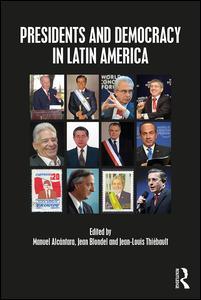Presidents and Democracy in Latin America
Coordonnateurs : Alcántara Manuel, Blondel Jean, Thiébault Jean-Louis

This new textbook provides students with a comprehensive and accessible introduction to the presidents and presidential leadership in Latin America. Unlike other texts, Presidents and Democracy in Latin America integrates both political analysis and major theoretical perspectives with extensive country-specific material.
Part One examines the developments in recent years in Latin American presidentialism and identifies different characteristics of society and politics which have influenced Latin American governments. The personalization of political life and of presidential government help to illustrate the character of Latin American politics, specifically on the type of political career of those who occupied the presidential office, the leadership style of these presidents and the type of government which they led.
Part Two studies two presidents in each of six countries in the region which reflect the broad trends in the political and electoral life: Argentina, Brazil, Chile, Colombia, Mexico, and Peru. Each case study first provides the biographical background of the president; it outlines the political career of the president both inside and outside of a party, including at the local level; the popularity of the president at the time of the presidential election is given, as well as the mode of selection of the candidates (selection by party leaders only, by party members or by a primary). The relation of the president with the government or ministers, especially if there is a coalition government, is detailed.
This textbook will be essential reading for all students of Latin American Politics and is highly recommended for those studying executive politics, political leadership, and the state of democratic governance in Latin America.
Part 1: Presidentialism and Political Capital in Latin America 1. Politics in Latin America in the Past Third of a Century (1978-2015) [Manuel Alcántara] 2. Presidential Leadership in Latin America [Jean-Louis Thiébault] 3. The Character of the ‘Government’ in Latin American Presidential Republics [Jean Blondel] 4. Political Career Trajectories and Social Backgrounds: Latin American Presidents in Comparative Perspective (1978-2015) [Manuel Alcántara, Mélany Barragán and Francisco Sánchez] Part 2: Personal Power and Institutional Constraints: Case Studies 5. Mexico. Zedillo and Calderón: The Challenges of Governing under Adversity[Marisol Reyes] 6. Colombia. Political Leadership in a Turbulent Environment. César Gaviria and Álvaro Uribe Vélez [Javier Duque] 7. The singularity of Peruvian Politics and the Role of Presidential Leadership. The Cases of Alberto Fujimori and Alan García [Martín Tanaka and Jorge Morel] 8. Presidential Leadership in a Robust Presidency: the Brazilian Case [Magna Inácio] 9. Menem and Kirchner. The Two Faces of Peronism? [Mario D. Serrafero] 10. The Presidential Government of Chile [Carlos Huneeus] 11. Conclusion
Manuel Alcántara is a Full Professor at the University of Salamanca and currently Director of FLACSO Spain. His field research concerns parliament elites in Latin America, parliamentary performance in Latin America, and democracy and elections in Latin America. His most recent books include El oficio de político (2012) and Sistemas Políticos de América Latina (2013, 4th edition) and, as editor, Procesos políticos y electorales en América Latina(2010-2013) (2013) and Selección de candidatos y elaboración de programas en los partidos políticos latinoamericanos (2013).
Jean Blondel is a Professor at European University Institute, Florence, Italy. He became a Professor of Political Science at the EUI in 1985 and was an External Professor from 1994 to 2000. Prof. Blondel set up the Department of Government at the University of Essex in 1964 and co-founded the European Consortium of Political Research. He was the winner of the Johan Skytte Prize in Political Science for 2004. He has been awarded honoris causa doctorates from the University of Salford, the University of Essex, the University of Louvain-la-Neuve, the University of Turku, the University of Macerata (2007), and the University of Siena (2008).
Jean-Louis Thiébault is Professor Emeritus and former Director (1997–2007) at the Institute of Political Studies, Lille, France. He has co-edited with Jean Blondel, The Profession of Government Minister in Western Europe (1991); with Gérard Marcou, La décision gouvernementale en Europe (Belgique, Danemark, France, Pays-Bas et Royaume-Uni) (1996); with Gérard Marcou and François Rangeon, La coopération contractuelle et le gouvernement des villes (1997); and with Jean Blondel, Political leadership, parties and citizens: The personalisation of leadership (2009). He has also published 'Book review: Alain Rouquié, A l'ombre des dic
Date de parution : 09-2017
15.2x22.9 cm
Disponible chez l'éditeur (délai d'approvisionnement : 14 jours).
Prix indicatif 53,83 €
Ajouter au panierDate de parution : 09-2017
15.2x22.9 cm
Disponible chez l'éditeur (délai d'approvisionnement : 14 jours).
Prix indicatif 178,41 €
Ajouter au panierThème de Presidents and Democracy in Latin America :
Mots-clés :
Latin American Presidential Republics; Latin America; Universidad De Chile; Latin American Studies; Patricio Aylwin; Latin American Politics; Latin American Presidents; Latin American History; Latin America’s Transition; Comparative Politics; Young Man; Leadership; Public Administration; Political Leadership; Latin American Executives; Executive Politics; Ollanta Humala; Presidency; Military Junta; Democracy; Junta; Presidential Leadership; Direct Democracy; Political Institutions in Latin America; Presidential Candidacy; coalition presidentialism; FHC’s Administration; Jean Blondel; Tv Azteca; Jean-Louis Thiébault; Ai Camp; Peruvian Politics; Francisco Shez; Ernesto Zedillo; Marisol Reyes; La Moneda; Javier Duque; Parliamentary Cabinets; Martín Tanaka; Peronist Party; Jorge Morel; Medellin Cartel; Magna Ino; High Gdp Growth Rate; Mario D; Serrafero; Lula’s Administration; Carlos Huneeus; Freedom Day



